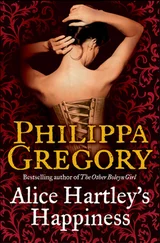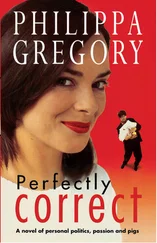Celia looked still uncertain but she could not face an open clash with Harry, and the topic was safely closed. I saw John’s hard eyes on me and knew I had not turned him from his dogged pursuit of the truth of my plans, of the trail of my deceptions. But without Celia’s gentle support he did nothing. He merely sat in silence and watched my face. Only when his eyes were on Celia did they soften.
After that, I took good care that Celia and John should be off the estate on the day I expected Mr Gilby. I reminded Celia of the urgent need for new shoes for both children and the toughness of the village cobbler’s leather — good enough for Harry and me when we were small, but quite inadequate for the little princess. Celia decided to take both children to Chichester for a day’s shopping and we all agreed to go. At the last moment I feigned a headache and cried off, and had the satisfaction of seeing the three of them, and the two children, bowling off down the drive a clear hour before I expected Mr Gilby.
He was punctual, which I like. But that was the only thing I liked about him. He was a slight man, a townsman with natty, almost dandified, well-cut clothes, snowy linen, and boot-tops so bright you could see his weaselly little face upside-down, looking up at you when he bowed low. He bowed often. He knew, and I knew, that Wideacre wheat had never before been sold while it grew in the fields. That Wideacre wheat had always been offered first to the people whose labour had made it tall and proud and golden. He knew that every prickly, self-important Squire of Wideacre had suspected and disliked London merchants, the clever money-men who might bluff or cheat an honest man out of his profits. And he knew also, as I feared half the City knew, that the estate was overcommitted, that our notes and mortgages were in the hands of Mr Llewellyn, the bankers, and two other London merchants. That we had to deal with the people we had despised because we were locked into a trap of debts and loan repayments. He knew all this as well as I. But no shadow of it appeared on his smooth pale face as he handed me into the gig and I drove him down the drive.
He glanced around the woods mentally pricing them, and he looked left through the hedge and the line of trees to the old meadows, which were now featureless, flowerless, with green tall corn.
‘All this?’ he asked.
‘Yes,’ I replied shortly and, taking one hand from the reins, swept a gloved finger over the wide acreage shown on the map on the seat between us.
He nodded and asked me to stop the gig. I waited on the driver’s seat while he strolled among the fields like a lord on his own land, and plucked a handful of green ears of wheat, and peeled back the silvery-green sheath, and popped the raw unripe kernels into his mouth and chewed them like a thoughtful locust that I had been fool enough to invite on to my land. The only way to keep the distaste off my face and out of my voice was to be as cold and as bloodless as he. And that was easy. The pain of driving a merchant around the land, where my papa had sworn no business man would ever tread, was turning me to ice; even though the afternoon sun was blazing down on my head and I was hot and stuffy in my long-skirted driving gown and jacket.
‘Good,’ he said, as he swung back into the gig. ‘Excellent crop. Promising. But it’s an uncertain business, buying the crop before it’s cut. You have to make allowances for the risks, Mrs MacAndrew.’
‘Indeed I do,’ I said civilly. ‘Would you like to see the down-land fields now?’
He nodded his assent, and I drove him down the drive and up the bridle-way to the slopes of the downs. The plantation on our left was thriving, but I could scarcely glance at it without a sinking feeling of guilt in the pit of my stomach. Wideacre water and earth were feeding these sweet dark springy trees. But the trees no longer belonged to Wideacre. They were Mr Llewellyn’s, and the wide, lovely crescent of the plantation my papa had ordered with such pride was not a source of wealth for the future, with limitless wood for building and burning. It was gone. Sold as it stood. Before it even reached its mature height. Now I was selling the corn while it was still green. Nothing seemed to belong on Wideacre any more. Not the trees. Not the corn. Not even me.
Mr Gilby climbed down again and walked among the wheat. On these north-facing slopes the crop was later, and the little kernels he put in his mouth were as small as rice grains, still pale green with an unripe pod.
‘Good,’ he said again. ‘But a risky business. A very risky business.’
The quality of Wideacre wheat against the chances of its being spoiled were his themes all the long afternoon while I sweated inside my stays and shivered from the dread I felt.
He strolled in my fields, and looked at my sky as if he might buy it as well, in a job lot. No doubt the blue sky and the hot white clouds were ‘good, but risky’ too.
He wanted to see the common land fields and we had to drive through Acre. I would have preferred to take the track through the woods but the bridge by the mill was up, and there was no easy way around for the gig. No doors were slammed at the sound of my horse’s hoofs this time, but Acre village was as silent as if it had been itself enclosed and the people gone on the tramp.
‘Quiet place,’ said Mr Gilby as the unearthly hush penetrated even his money-box brain.
‘Aye,’ I said drily. ‘But not empty, you can be sure.’
‘Having trouble with the poor?’ He cocked a knowledgeable black eyebrow at me. ‘They won’t adapt, will they? They just won’t learn to change.’
‘No,’ I said shortly.
‘Bad business,’ he murmured. ‘Don’t have any rick-burning round here, do you? No crops spoiled in the fields? No attacks on barns?’
‘We never have,’ I said firmly. ‘They complain but they would dare nothing more.’
‘Good,’ he said. ‘But risky,’ he said after a pause.
‘Risky?’ I said, clicking Sorrel into a trot once we were clear of that ominous deserted village street.
‘Risky,’ he said. ‘I can’t tell you how much trouble I have getting my grain wagons through the countryside on the way to London. I have had mothers lying down in the road before them with their babies in their arms. I have had fathers surrounding the wagons and cursing the carriers — as though anyone was to blame! I’ve even been caught by the mob myself once or twice. One time I actually had to sell half a wagon to them at the market price before they would let me through!’
‘We don’t have any of that here,’ I said firmly, a superstitious shiver down my spine.
‘Aye,’ he said. ‘Sussex is quiet at the moment. They’ll come to heel.’
We pulled up in the stable yard and I took him in by the west-wing door into my office.
‘Handsome room,’ he said, looking round as if he were pricing the furniture.
‘Thank you,’ I said shortly, and rang for tea.
While Stride brought the tray and set up the urn Mr Gilby wandered along my bookshelves, inspecting the red leather bindings with approval. He put a flat hand on the rent table and turned it experimentally to feel the smooth movement as it spun. He fingered the backs of the chairs and shuffled his boots in the plain deep-pile carpet. Even while he sat and drank his tea his eyes flickered around, looking out of the window where the birds sang and the bees hummed in the rose garden, at the door with its polished walnut wood, at my desk and the great cash box beside it. At the comfort and elegance of a room furnished with goods hundreds of years old.
‘Here’s my offer,’ he said, scrawling on a piece of paper. ‘I won’t haggle with you, Mrs MacAndrew, you’re far too good a farmer. You know the value of your crop. It’s good, but it’s risky. I like the crop but I don’t like the look of the road that leads from Acre to the London road. There are too many places there for trouble from men who think they know more about farming than their masters. I like your crop, but I don’t like the look of your village. So I think it’s good, but risky, Mrs MacAndrew. And my price represents that.’
Читать дальше
Конец ознакомительного отрывка
Купить книгу












